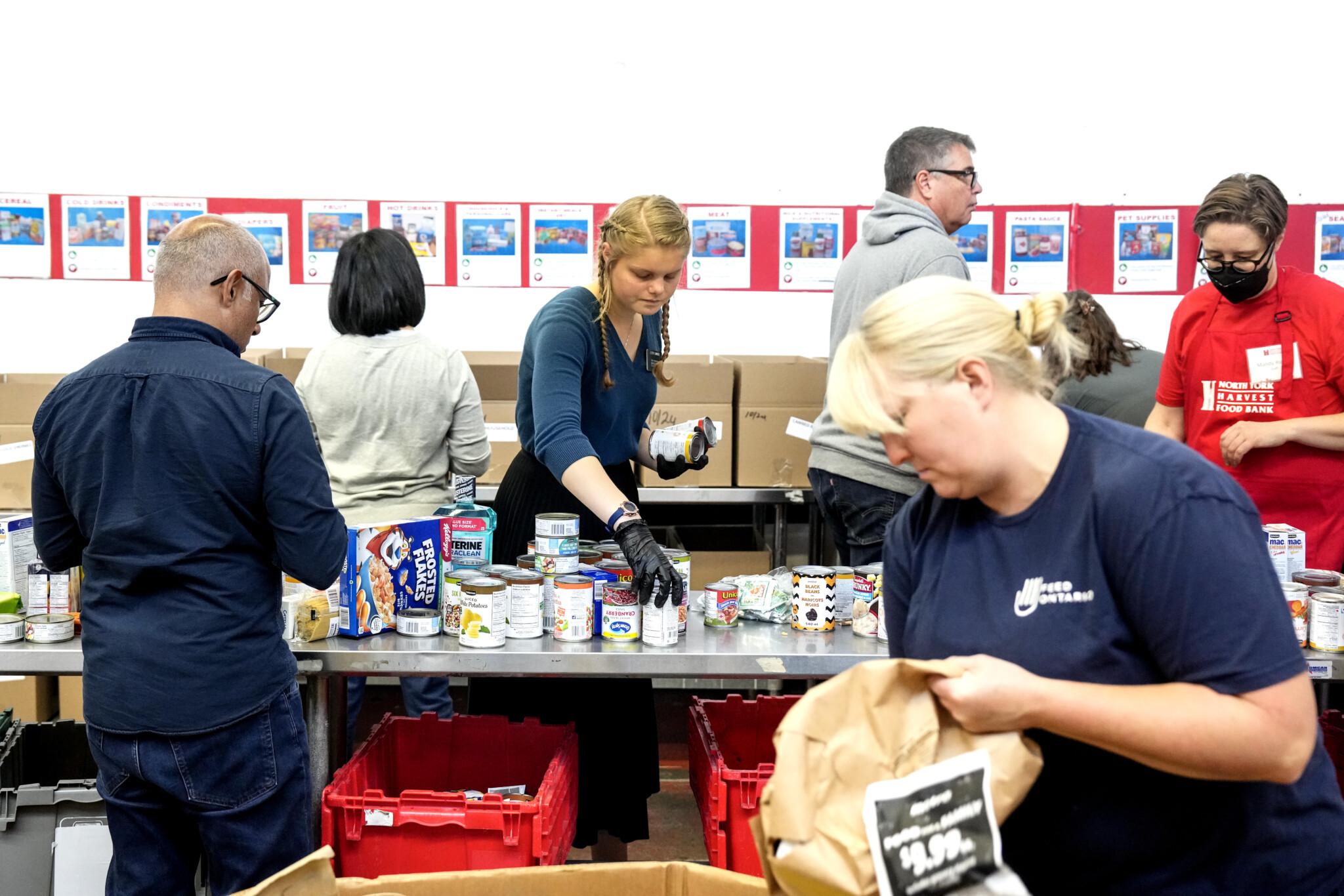As the upcoming Canadian federal election looms large, two key issues—health care and affordability—are competing for attention amid the Trump tariffs controversy. While the tariffs are both urgent and significant, their dominance in the discourse has overshadowed other critical concerns, particularly the worsening affordability crisis. But for everyday Canadians, these fundamental underlying issues are not so easily ignored.
Canada is experiencing a growing food insecurity crisis, with municipalities like Kingston, Mississauga, and Toronto officially declaring food emergencies. While the broader economy has shown some signs of improvement in recent months, many Canadians continue to struggle, unable to experience the benefits of economic growth.
To gain a comprehensive understanding of the crisis, Food Banks Canada has partnered with Pollara Strategic Insights to conduct an in-depth examination of food insecurity across the country. The Food Banks Canada Quarterly Report serves as a key analytical tool in monitoring economic hardship and its impact on financial, emotional, and psychological well-being. The findings from the report are based on 1,500 online interviews conducted with adult Canadians every quarter. This study began in April 2024 and drawing from a full year of data, the latest January 2025 report reveals a worsening situation that underscores the urgent need for intervention.
The context
Financial distress remains a major concern, with over 40 percent of Canadians reporting that they feel worse off financially compared to the previous quarter (October 2024), marking an alarming 11-point increase. Additionally, 43 percent describe themselves as financially stressed, a 13-point surge since October 2024. These figures reflect a mounting sense of economic insecurity. Younger generations are disproportionately affected with 56 percent of Gen Z and 53 percent of Millennials reporting significant financial strain. Regional disparities are also evident, with Alberta (53 percent) and the Prairie provinces (48 percent) exhibiting some of the highest levels of financial stress.
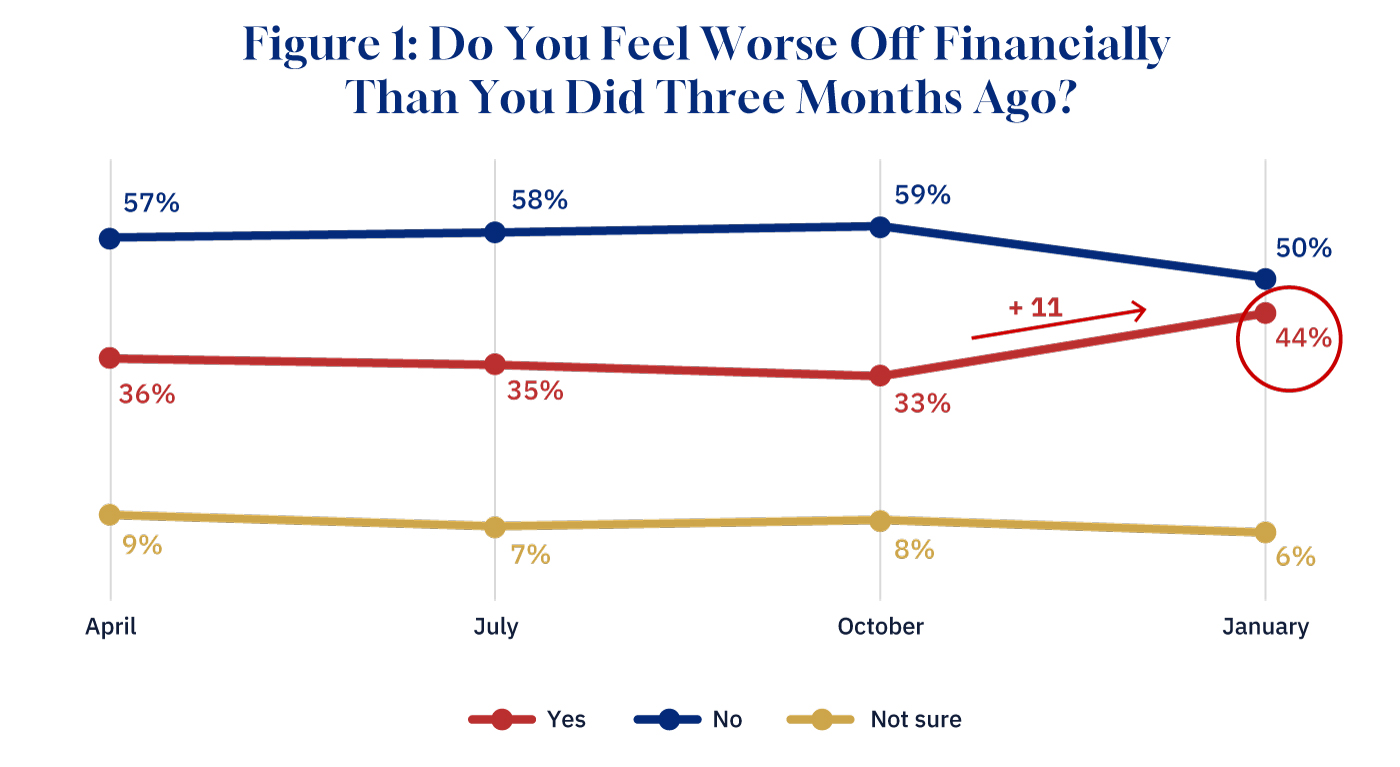
Many Canadians fear that their financial situation will deteriorate further. The report finds that 20 percent of Canadians believe they will need to take on additional debt if their circumstances do not improve. This concern is particularly acute among Millennials (33 percent), Gen Xers (24 percent), and visible minorities (25 percent), highlighting the widespread financial vulnerability across multiple demographic groups.
The impact
As food affordability remains a significant challenge, Canadians are increasingly forced to make difficult choices. A staggering 43 percent of people report purchasing food at a discount, a seven-point increase from the previous quarter. Meanwhile, 29 percent of Canadians report struggling to pay their bills, reflecting a sharp 10-point increase from October. The inability to purchase enough food to meet basic needs has also risen, with 23 percent of Canadians now reporting that they are unable to buy sufficient food, a seven-point increase.
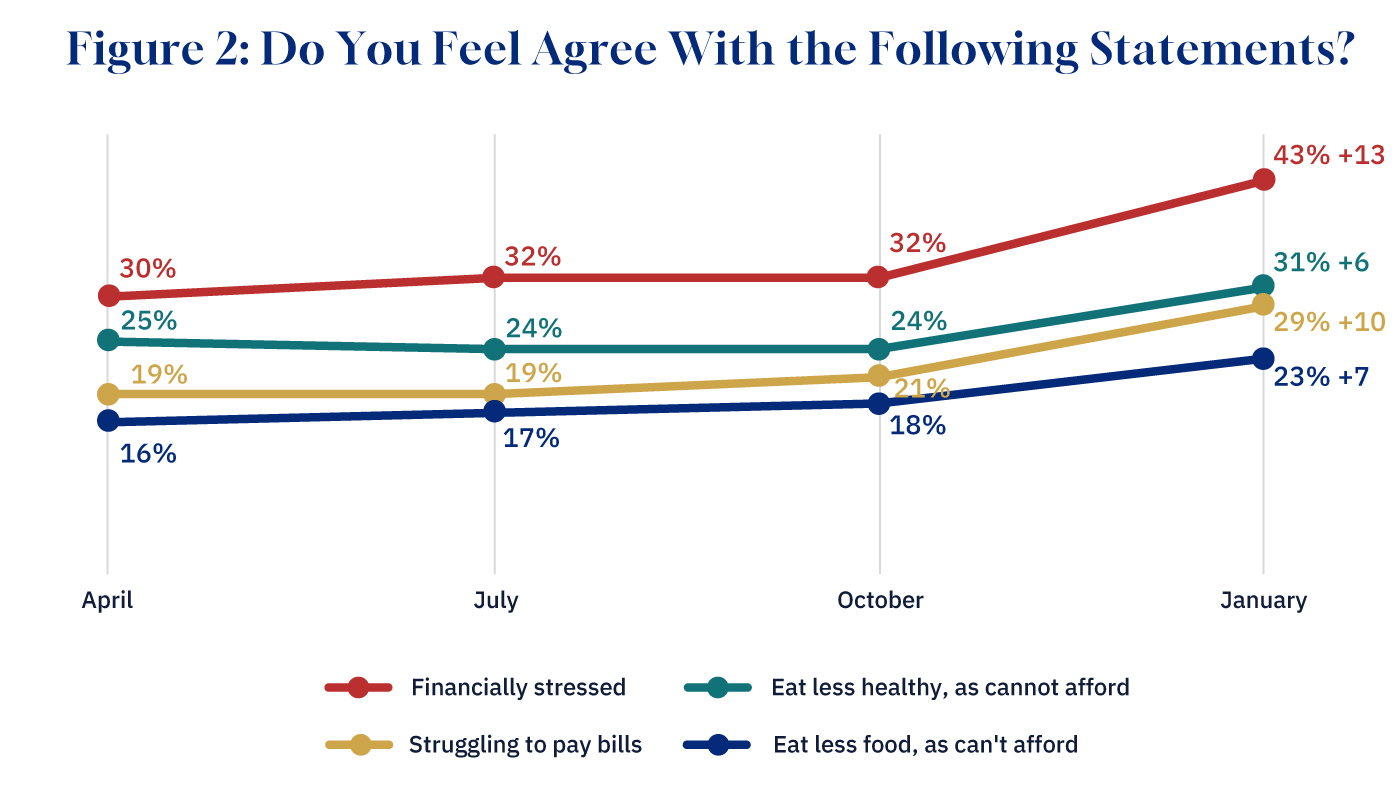
The hidden toll
Beyond financial hardship, the crisis is taking a heavy emotional toll. As noted above, 43 percent of Canadians feel financially stressed. This mental health impact is particularly pronounced among Gen Z (56 percent), Millennials (53 percent), and visible minorities (55 percent). The consequences of food insecurity extend beyond emotional distress to long-term health risks. Poor diet quality, exacerbated by financial constraints, is a growing concern, with 31 percent of Canadians eating less healthy food due to affordability issues.
Young adults and lower-income individuals are disproportionately affected, with 40 percent of Gen Z respondents and 46 percent of low-income individuals prioritizing affordability over nutrition. This trend is particularly concerning given the links between poor diet quality and increased risks of chronic disease, reduced energy levels, and deteriorating mental well-being.
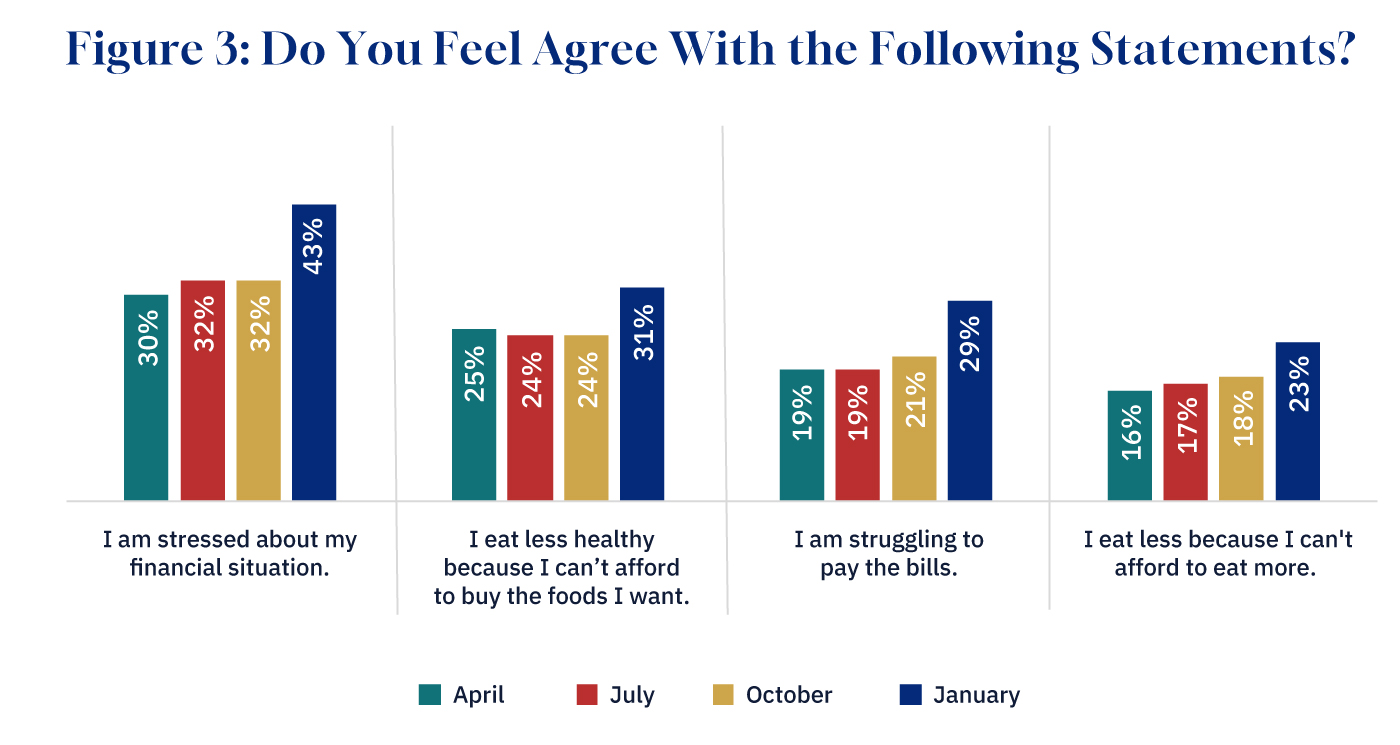
Financial struggles are also disrupting other fundamental aspects of life. According to the report, 29 percent of Canadians struggle to pay their bills, with higher numbers among younger adults (37 percent), low-income earners (46 percent), visible minorities (42 percent), and those with only a high school education (36 percent). Furthermore, 23 percent report eating less overall due to financial constraints, a figure that rises to 38 percent among Gen Z respondents and 36 percent among low-income individuals. The emotional impact of these struggles—feelings of shame, helplessness, and anxiety—further compounds the stress of living under financial strain.
What’s next?
As the crisis deepens, many Canadians are growing increasingly frustrated with the factors they believe are driving food prices higher and are seeking someone to blame. According to the report, 32 percent attribute rising costs to corporate greed, 21 percent hold the federal government responsible for failing to address affordability concerns, and 19 percent cite global instability as the primary cause.
Perceptions of blame vary across demographics, with Millennials, Gen Xers, and Albertans more likely to fault the government. However, assigning blame can only go so far. These frustrations fuel a broader sense of economic powerlessness, heightening stress, dissatisfaction with both corporations and government policies, and an urgent demand for solutions.
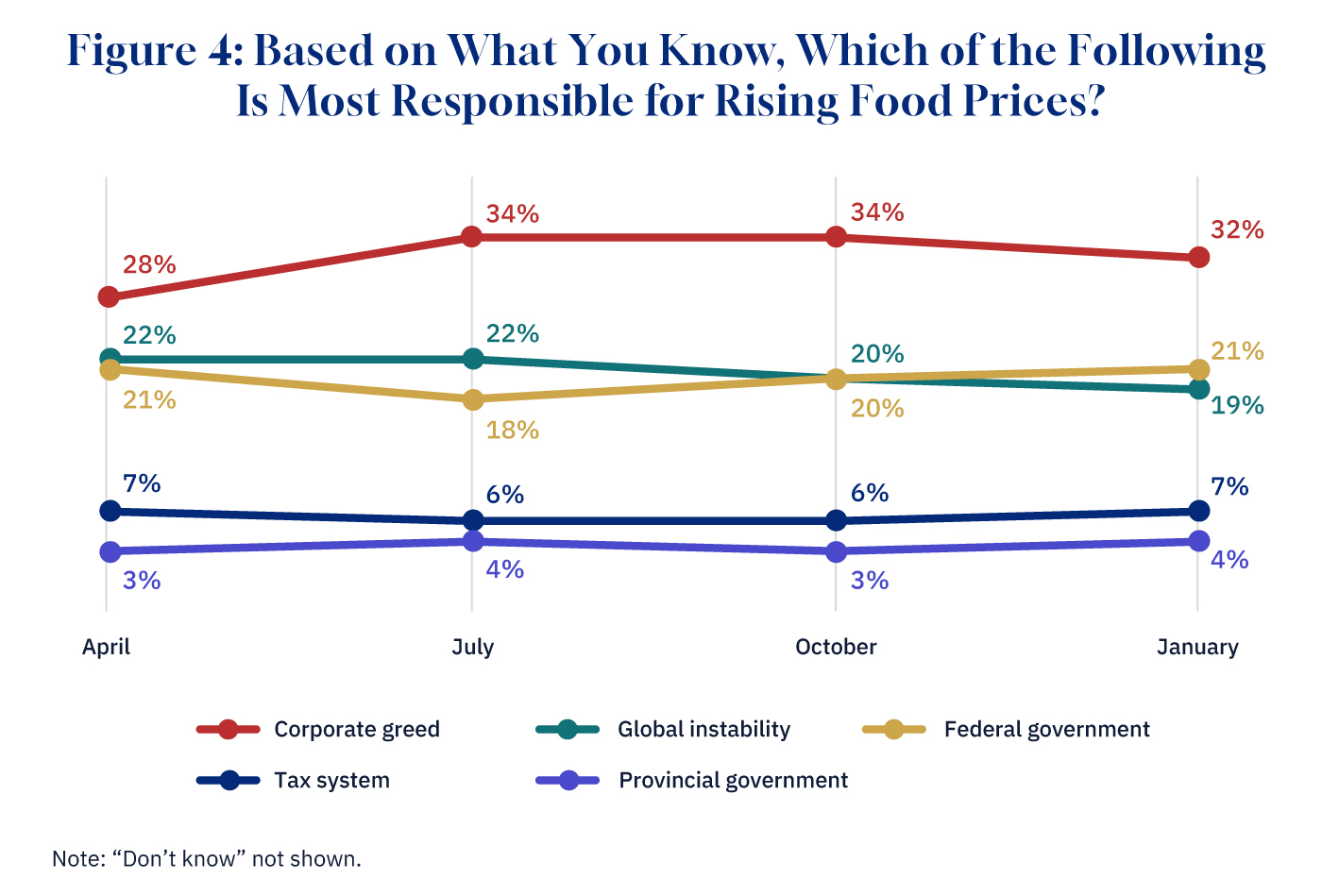
The Food Banks Canada Quarterly Report presents a sobering assessment of Canada’s escalating financial strain and a deepening need for intervention. Rising costs are not only making it harder for Canadians to afford essentials like food and bill payments but are also leading to deteriorating diet quality and heightened stress levels. These challenges are no longer confined to low-income households—they are impacting individuals and families across all income brackets, including those who are fully employed, widening socioeconomic divides.
As Food Banks Canada’s latest HungerCount report shows, people in Canada are turning to food banks in record numbers. The speed of this increase has been unimaginably fast. Many of the over 2 million people turning to food banks each month are doing so for the very first time. One in five are currently employed and still can’t make ends meet. A third of those served by food banks are children. And as this most recent study demonstrates, the number of people struggling increases with each passing month.
As for the food banks at the front lines of this crisis, they are buckling under the strain. A third of food banks did not have enough food to satisfy the demand last year. Each new jolt to the economy adds to the strain on a system that was never meant to become the permanent spine of a country. Food banks will always do everything that they can to be there for their communities, but they need help, just like the people counting on them each and every day.
Tackling this crisis requires a comprehensive, multi-pronged approach that engages policymakers, businesses, and community organizations in meaningful solutions. Once the federal election kicks off, candidates must address this key issue to Canadians and present policies to:
- Fix our broken social safety net. Expand targeted assistance programs for low-income individuals and families, including direct financial aid and subsidies for essential goods.
- Improve supports for low-income workers. Modernize Canada’s Employment Insurance and employment training programs to better reflect our modern labour market.
- Enact short and long-term affordability strategies. Address the root causes of high living costs through affordable housing initiatives, rent-assist programs, and economic reforms.
The intersection of financial hardship, food insecurity, and emotional distress has escalated into a national crisis—one that demands urgent, coordinated action. The looming tariff threat will only worsen these challenges. Without decisive intervention, the crisis will deepen, jeopardizing the economic and social well-being of millions. All sectors must come together to ensure every Canadian has access to basic necessities, empowering individuals to reach their full potential—for themselves and for the country. Elections should serve as the ideal forum for this discussion.
